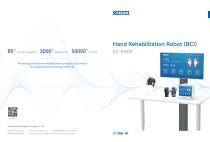
Catalog excerpts

Hand Rehabilitation Robot (BCI) 80 Countries & regions Medical units Providing innovative rehabilitation products & services for hospitals/communities/families Shanghai Siyi Intelligent Technology Co., Ltd. Website: www.syrebo.com Office: (+86) 400-6886-275 E-mail: wmsales@siyizn.com Address: 2F, Building 13, 2388 Xiupu Road, Pudong New Area, Shanghai
Open the catalog to page 1
Hand Rehabilitation Robot (BCI) SY-BR09 Based on the principles of motor imagery and neural plasticity, through brain-controlled training, it stimulates patient’ active movement awareness, achieving a "perception-control" bidirectional closed-loop neural s stimulation, reshaping users' neural pathways, and significantly improving rehabilitation effectiveness. Virtual reality training games EEG acquisition system Brian-inspired algorithm Active rehabilitation Cutting-edge noise reduction capability to capture EEG, ensure data accuracy Suitable for 0-5 muscle strength patients, covers all...
Open the catalog to page 2
Product Features Intelligent user management Multi-sensory task-oriented training Integrate user profile and multi-assessments in one user management, simultaneously checking rehabilitation progress in multiple dimensions. Task-oriented training combining visual, auditory, sensory and other multi-dimensional stimuli to improve overall rehabilitation efficiency. EEG data tracking technology Advanced data processing technology enables EEG signal collection smoothly. EEG signal data can be stored and viewed on MATLAB software, providing references for rehabilitation programs and guidance for...
Open the catalog to page 3
Clinical Evidence 1. BCI-based neurorehabilitation is superior to common rehabilitation treatments such as motor imagery, Patients with hand dysfunction caused by stroke, brain injury, cerebral palsy, hand trauma, parkinson's disease, mirror therapy, robot-assisted training, constraint-induced movement therapy, virtual reality therapy, and tDCS. Reference: Cervera MA, Soekadar SR, Ushiba J, et al. Brain-computer interfaces for post-stroke motor rehabilitation: a meta-analysis. Ann Clin Transl Neurol. ���� Mar ��;�(�):���-���. Rehabilitation Department Stroke Center Neurosurgery Department...
Open the catalog to page 4All Syrebo catalogs and technical brochures
-
SY-HR08E Catalog
4 Pages
-
SY-HR06E Catalog
4 Pages
-
product manual SY-HRC11
6 Pages







